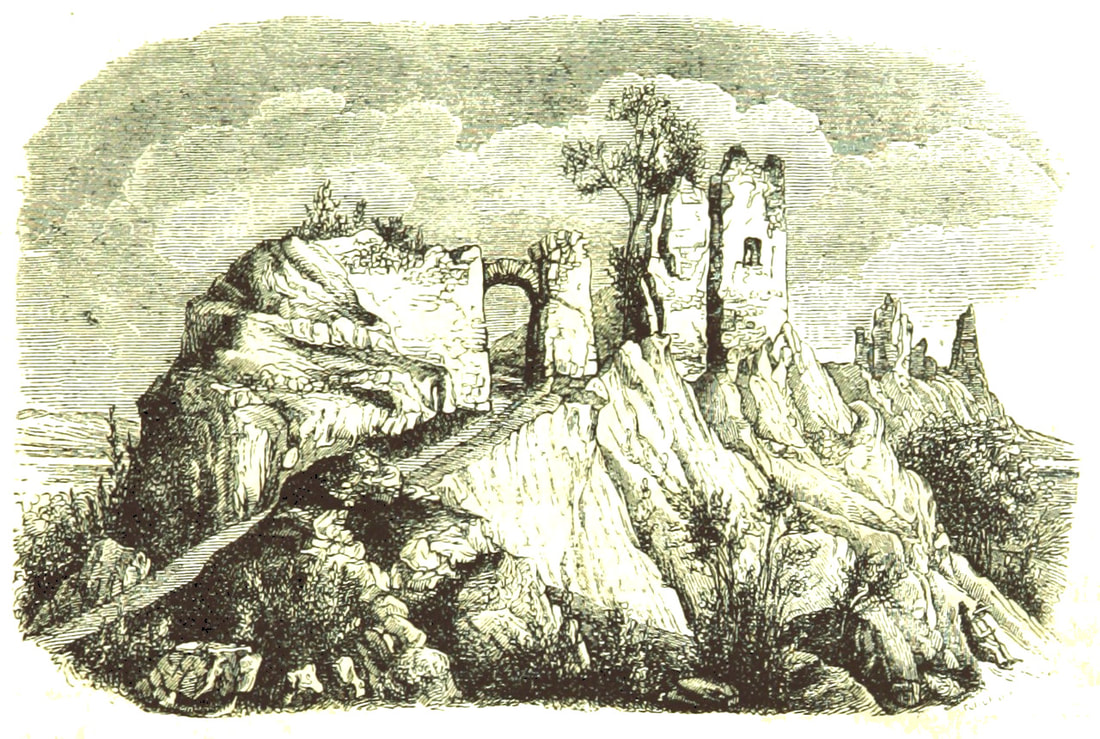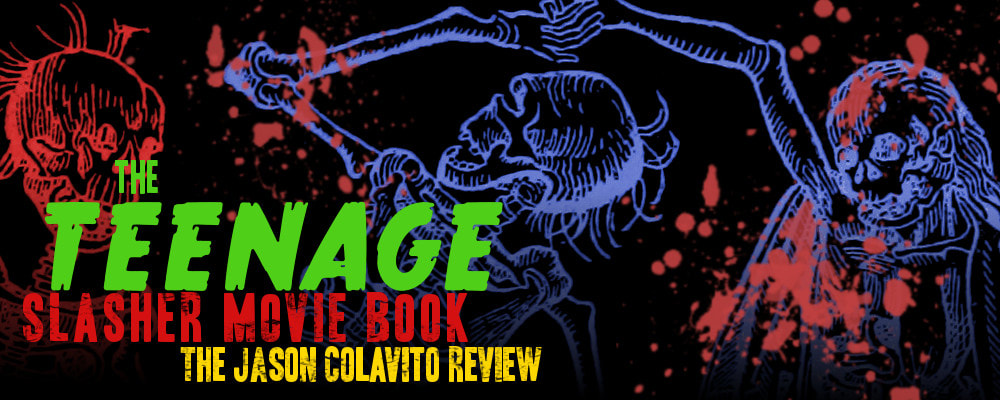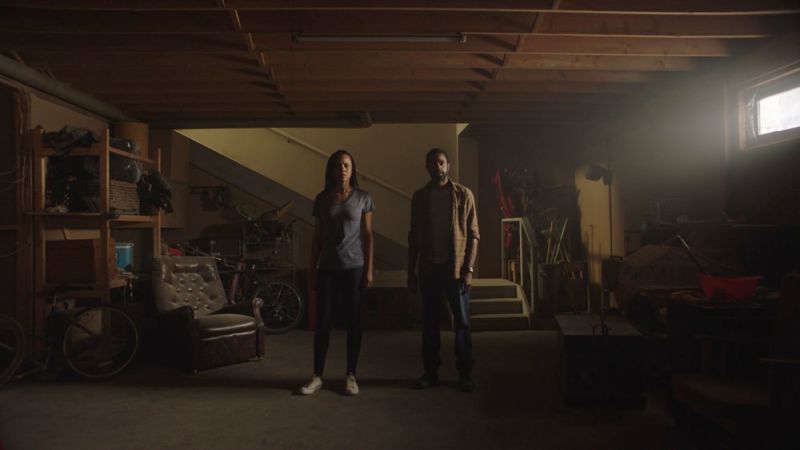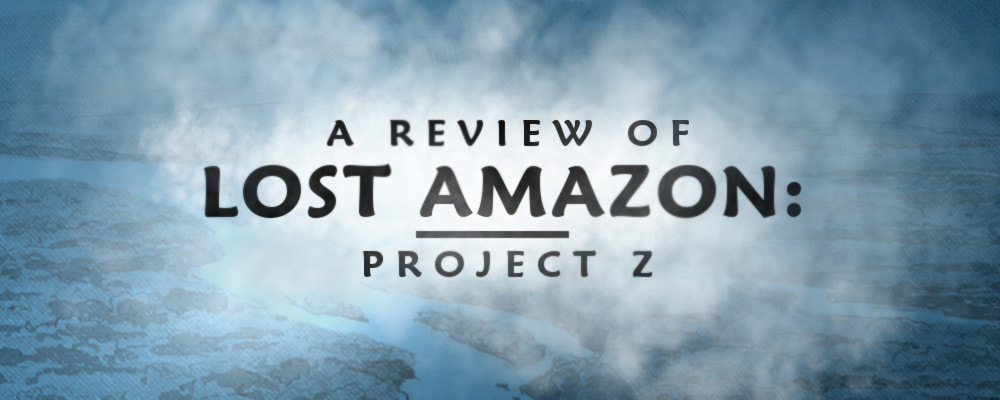|
Happy Halloween! I’m taking the day off to mark the occasion with my son, who is dressing up as his favorite animal, an owl, this year. In the spirit of the holiday, please enjoy a selection of seasonally appropriate content.
6 Comments
The Teenage Slasher Movie Book (2nd revised and expanded ed.) J. A. Kerswell | 224 pages | Companion | October 2018 | ISBN: 978-1620083079 | $24.99 Horror fans have sliced and diced the genre into innumerable subgenres—if you will forgive the terrible pun. It is now possible to be a fan exclusively of Korean zombie movies, or films about people trapped in overly complex torture devices, or even movies about creepy strangers posing menacingly outside of young adults’ windows. It is both an astonishing time to be alive, and also kind of uncomfortable to have Hollywood feeding so much of the same that the most obscure horrors are no longer isolated gems cherished for their own sake but are instead copied and pasted until the original no longer stands out. There is a certain degree of homogenization in horror, and the homages, copycats, and riders of coattails end up retroactively detracting from the true originals.
Fred C. Woudhuizen is an independent Dutch scholar who has produced a number of obscure publications making a series of controversial claims to have deciphered hitherto unreadable texts to reveal surprising confirmation of Greek mythological traditions. He argued, for example, that the Phaistos Disc was in fact a letter written by the Luwians to Nestor, the king of Pylos in the Odyssey. In another, he argued that the otherwise indecipherable Etruscan language is in fact a patois of colonial Luwian. The Luwians, for what it’s worth, are his major interest, and his arguments, as one published review of his scholarship put it, are “alas, not very convincing.”
Tonight, Syfy launches the new season of Channel Zero, its low-budget knockoff of American Horror Story. Like other outsourced copies, the Canadian-produced series tends toward lower quality and a more workmanlike, no-frills approach to its product. I have been critical of the anthology series’ past efforts, all of which I have found to be aesthetically displeasing, occasionally wooden, and rather thinly sketched. However, I will offer praise for the remarkable renovation that the series has undertaken for its new six-episode edition, “The Dream Door,” which premieres this evening and will run a new episode each night until Halloween.
Regular readers will remember George Knapp, the investigative reporter at KLAS-TV in Las Vegas who is closely connected to the story of billionaire Robert Bigelow’s search for interdimensional portals and UFO-driving poltergeists at Skinwalker Ranch in Utah. Knapp has covered UFOs for several decades and is a frequent guest host on Coast to Coast A.M., the paranormal overnight radio show. Knapp recently appeared in Hunt for the Skinwalker, a documentary making use of footage from an abandoned documentary project he started about the ranch decades ago but put on hold at Bigelow’s request. In reviewing the documentary and subsequent radio appearance, I criticized Knapp for agreeing to receive secrets about the Skinwalker Ranch investigation and for keeping those from the public for two decades, and Knapp is hopping mad about it, saying that I don’t know my “ass from a hole in the ground, certainly not about investigative reporting.” The crux of the argument is that Knapp is adhering to his employers’ formal ethics policies, while my concern is for the consequences of the decisions that he has made.
Today I present the book description for a new self-published volume, unread by me, that bills itself as the first in a ten-volume (!) collection of the alleged journals of Henry I Sinclair, Earl of Orkney, the medieval Norse-Scottish prince who gained fame when a German from a Scottish expatriate family identified him as the fictitious Prince Zichmni from the sixteenth century hoax Zeno manuscript, and Richard Henry Major argued that the name was a corruption of “Sinclair” due to bad handwriting. Despite the many problems with the narrative—not least, in reality one of its main characters was in Greece in 1392 and on trial in Venice in 1394 before dying in 1402 while the narrative has him journeying to Greenland in 1393 and dying in 1394—the story has become a touchstone for the alternative history community. Since the late 1800s, a grab-bag of Scottish nationalists, white nationalists, conspiracy theorists, and Templar fetishists have raised Henry Sinclair to a demigod (literally—Frederick Pohl declared him the Micmac demigod Glooscap) and imagine him as the founder of a fabulous colony in the Americas a century before Columbus.
Ever since Expedition Unknown departed the Travel Channel for the Discovery Channel mothership, I can’t say I’ve paid much attention to the network, except to note that the parent company has gradually transformed it into a clone of its Destination American channel, peppered with paranormal and monster programs for the sake of appealing to the majority of Americans who believe in fantasies without evidence. Lost Amazon: Project Z debuted last week on Travel to little fanfare, but its first (and apparently only) episode encapsulates many of the tropes that remain so distressing in cable TV’s continued exploitation of indigenous and non-Western history as grist for colonialist and Christianist narratives. Naturally, the first episode is about hunting for Giants in South America.
Every once in a while, I’m just not feeling up to writing a lengthy blog post. I have a stack of new books I’ve been asked to review, but none of them has really captured my imagination. Only one seems really worthy of a full-length review, but I’ve been struggling to get it read. The reason for that is sort of funny, really. It’s a beautifully designed coffee-table book about horror movies, but they printed all of the text in black against dark red and dark blue pages, and in the time I have to read after my son goes to bed at night, my eyes are too tired to strain to see the text. There isn’t enough contrast unless I flood the page with light, and that much light in my eyes that late makes it hard for me to go to bed after I’ve finished reading for the night. I also have an advance copy of a new book claiming that Biblical stories of ancient Israel all took place in Egypt and can be confirmed by archaeology, but I am having difficulty bringing myself to care. Too much of our country’s public life is devoted to finding new ways to “prove” the Bible true. The book isn’t out until 2019, so I might manage to plod through it at some point.
A couple of years ago, W. Scott Poole wrote a book about H. P. Lovecraft that I did not like, and a few years before that, he wrote a book about monsters in America that I also did not like (Part 1 and Part 2). Having read much of his work, it is clear that he and I have very different views on the origins and development of the horror genre. This week Poole releases a new book, Wasteland: The Great War and the Origins of Modern Horror, unread by me, about what he sees as the profound impact of World War I on the development of the horror genre. While there is no doubt that the war found its way into horror—as it did comedy, as Laurel and Hardy, the Marx Brothers, and many others attest—my visceral reaction to his claims in a recent Vice interview is that he has grossly overstated the case.
Each year, Chapman University publishes its annual survey of American fears, and each year the results get worse. In the two metrics that I have monitored over the past three or four cycles, we have witnessed self-reported belief in ancient astronauts and lost Atlantis-like civilizations climb to record levels, among the highest rates of belief ever recorded. Belief in Atlantis became a majority belief last year, and it now stands at 57%, up from 55% last year. Belief in ancient astronauts rose from 35% to 41%, representing a plurality of respondents. (The remaining respondents either disbelieved or were unsure—the latter category not exactly being great for the side of science.)
|
AuthorI am an author and researcher focusing on pop culture, science, and history. Bylines: New Republic, Esquire, Slate, etc. There's more about me in the About Jason tab. Newsletters
Enter your email below to subscribe to my newsletter for updates on my latest projects, blog posts, and activities, and subscribe to Culture & Curiosities, my Substack newsletter.
Categories
All
Terms & ConditionsPlease read all applicable terms and conditions before posting a comment on this blog. Posting a comment constitutes your agreement to abide by the terms and conditions linked herein.
Archives
July 2024
|
- Home
- Blog
- Books
-
Articles
-
Newsletter
>
- Television Reviews >
- Book Reviews
- Galleries >
- Videos
-
Collection: Ancient Alien Fraud
>
- Chariots of the Gods at 50
- Secret History of Ancient Astronauts
- Of Atlantis and Aliens
- Aliens and Ancient Texts
- Profiles in Ancient Astronautics >
- Blunders in the Sky
- The Case of the False Quotes
- Alternative Authors' Quote Fraud
- David Childress & the Aliens
- Faking Ancient Art in Uzbekistan
- Intimations of Persecution
- Zecharia Sitchin's World
- Jesus' Alien Ancestors?
- Extraterrestrial Evolution?
- Collection: Skeptic Magazine >
- Collection: Ancient History >
- Collection: The Lovecraft Legacy >
- Collection: UFOs >
- Scholomance: The Devil's School
- Prehistory of Chupacabra
- The Templars, the Holy Grail, & Henry Sinclair
- Magicians of the Gods Review
- The Curse of the Pharaohs
- The Antediluvian Pyramid Myth
- Whitewashing American Prehistory
- James Dean's Cursed Porsche
-
Newsletter
>
-
The Library
-
Ancient Mysteries
>
-
Ancient Texts
>
- Mesopotamian Texts >
-
Egyptian Texts
>
- The Shipwrecked Sailor
- Dream Stela of Thutmose IV
- The Papyrus of Ani
- Classical Accounts of the Pyramids
- Inventory Stela
- Manetho
- Eratosthenes' King List
- The Story of Setna
- Leon of Pella
- Diodorus on Egyptian History
- On Isis and Osiris
- Famine Stela
- Old Egyptian Chronicle
- The Book of Sothis
- Horapollo
- Al-Maqrizi's King List
- Teshub and the Dragon
- Hermetica >
- Hesiod's Theogony
- Periplus of Hanno
- Ctesias' Indica
- Sanchuniathon
- Sima Qian
- Syncellus's Enoch Fragments
- The Book of Enoch
- Slavonic Enoch
- Sepher Yetzirah
- Tacitus' Germania
- De Dea Syria
- Aelian's Various Histories
- Julius Africanus' Chronography
- Eusebius' Chronicle
- Chinese Accounts of Rome
- Ancient Chinese Automaton
- The Orphic Argonautica
- Fragments of Panodorus
- Annianus on the Watchers
- The Watchers and Antediluvian Wisdom
-
Medieval Texts
>
- Medieval Legends of Ancient Egypt >
- The Hunt for Noah's Ark
- Isidore of Seville
- Book of Liang: Fusang
- Agobard on Magonia
- Book of Thousands
- Voyage of Saint Brendan
- Power of Art and of Nature
- Travels of Sir John Mandeville
- Yazidi Revelation and Black Book
- Al-Biruni on the Great Flood
- Voyage of the Zeno Brothers
- The Kensington Runestone (Hoax)
- Islamic Discovery of America
- The Aztec Creation Myth
-
Lost Civilizations
>
-
Atlantis
>
- Plato's Atlantis Dialogues >
- Fragments on Atlantis
- Panchaea: The Other Atlantis
- Eumalos on Atlantis (Hoax)
- Gómara on Atlantis
- Sardinia and Atlantis
- Santorini and Atlantis
- The Mound Builders and Atlantis
- Donnelly's Atlantis
- Atlantis in Morocco
- Atlantis and the Sea Peoples
- W. Scott-Elliot >
- The Lost Atlantis
- Atlantis in Africa
- How I Found Atlantis (Hoax)
- Termier on Atlantis
- The Critias and Minoan Crete
- Rebuttal to Termier
- Further Responses to Termier
- Flinders Petrie on Atlantis
- Amazing New Light (Hoax)
- Lost Cities >
- OOPARTs
- Oronteus Finaeus Antarctica Map
- Caucasians in Panama
- Jefferson's Excavation
- Fictitious Discoveries in America
- Against Diffusionism
- Tunnels Under Peru
- The Parahyba Inscription (Hoax)
- Mound Builders
- Gunung Padang
- Tales of Enchanted Islands
- The 1907 Ancient World Map Hoax
- The 1909 Grand Canyon Hoax
- The Interglacial Period
- Solving Oak Island
-
Atlantis
>
- Religious Conspiracies >
-
Giants in the Earth
>
-
Fossil Origins of Myths
>
- Fossil Teeth and Bones of Elephants
- Fossil Elephants
- Fossil Bones of Teutobochus
- Fossil Mammoths and Giants
- Giants' Bones Dug Out of the Earth
- Fossils and the Supernatural
- Fossils, Myth, and Pseudo-History
- Man During the Stone Age
- Fossil Bones and Giants
- Mastodon, Mammoth, and Man
- American Elephant Myths
- The Mammoth and the Flood
- Fossils and Myth
- Fossil Origin of the Cyclops
- History of Paleontology
- Fragments on Giants
- Manichaean Book of Giants
- Geoffrey on British Giants
- Alfonso X's Hermetic History of Giants
- Boccaccio and the Fossil 'Giant'
- Book of Howth
- Purchas His Pilgrimage
- Edmond Temple's 1827 Giant Investigation
- The Giants of Sardinia
- Giants and the Sons of God
- The Magnetism of Evil
- Tertiary Giants
- Smithsonian Giant Reports
- Early American Giants
- The Giant of Coahuila
- Jewish Encyclopedia on Giants
- Index of Giants
- Newspaper Accounts of Giants
- Lanier's A Book of Giants
-
Fossil Origins of Myths
>
-
Science and History
>
- Halley on Noah's Comet
- The Newport Tower
- Iron: The Stone from Heaven
- Ararat and the Ark
- Pyramid Facts and Fancies
- Argonauts before Homer
- The Deluge
- Crown Prince Rudolf on the Pyramids
- Old Mythology in New Apparel
- Blavatsky on Dinosaurs
- Teddy Roosevelt on Bigfoot
- Devil Worship in France
- Maspero's Review of Akhbar al-zaman
- The Holy Grail as Lucifer's Crown Jewel
- The Mutinous Sea
- The Rock Wall of Rockwall
- Fabulous Zoology
- The Origins of Talos
- Mexican Mythology
- Chinese Pyramids
- Maqrizi's Names of the Pharaohs
-
Extreme History
>
- Roman Empire Hoax
- American Antiquities
- American Cataclysms
- England, the Remnant of Judah
- Historical Chronology of the Mexicans
- Maspero on the Predynastic Sphinx
- Vestiges of the Mayas
- Ragnarok: The Age of Fire and Gravel
- Origins of the Egyptian People
- The Secret Doctrine >
- Phoenicians in America
- The Electric Ark
- Traces of European Influence
- Prince Henry Sinclair
- Pyramid Prophecies
- Templars of Ancient Mexico
- Chronology and the "Riddle of the Sphinx"
- The Faith of Ancient Egypt
- Remarkable Discoveries Within the Sphinx (Hoax)
- Spirit of the Hour in Archaeology
- Book of the Damned
- Great Pyramid As Noah's Ark
- Richard Shaver's Proofs
-
Ancient Texts
>
-
Alien Encounters
>
-
US Government Ancient Astronaut Files
>
- Fortean Society and Columbus
- Inquiry into Shaver and Palmer
- The Skyfort Document
- Whirling Wheels
- Denver Ancient Astronaut Lecture
- Soviet Search for Lemuria
- Visitors from Outer Space
- Unidentified Flying Objects (Abstract)
- "Flying Saucers"? They're a Myth
- UFO Hypothesis Survival Questions
- Air Force Academy UFO Textbook
- The Condon Report on Ancient Astronauts
- Atlantis Discovery Telegrams
- Ancient Astronaut Society Telegram
- Noah's Ark Cables
- The Von Daniken Letter
- CIA Psychic Probe of Ancient Mars
- Scott Wolter Lawsuit
- UFOs in Ancient China
- CIA Report on Noah's Ark
- CIA Noah's Ark Memos
- Congressional Ancient Aliens Testimony
- Ancient Astronaut and Nibiru Email
- Congressional Ancient Mars Hearing
- House UFO Hearing
- Ancient Extraterrestrials >
- A Message from Mars
- Saucer Mystery Solved?
- Orville Wright on UFOs
- Interdimensional Flying Saucers
- Poltergeist UFOs
- Flying Saucers Are Real
- Report on UFOs
-
US Government Ancient Astronaut Files
>
-
The Supernatural
>
- The Devils of Loudun
- Sublime and Beautiful
- Voltaire on Vampires
- Demonology and Witchcraft
- Thaumaturgia
- Bulgarian Vampires
- Religion and Evolution
- Transylvanian Superstitions
- Defining a Zombie
- Dread of the Supernatural
- Vampires
- Werewolves and Vampires and Ghouls
- Science and Fairy Stories
- The Cursed Car
-
Classic Fiction
>
- Lucian's True History
- Some Words with a Mummy
- The Coming Race
- King Solomon's Mines
- An Inhabitant of Carcosa
- The Xipéhuz
- Lot No. 249
- The Novel of the Black Seal
- The Island of Doctor Moreau
- Pharaoh's Curse
- Edison's Conquest of Mars
- The Lost Continent
- Count Magnus
- The Mysterious Stranger
- The Wendigo
- Sredni Vashtar
- The Lost World
- The Red One
- H. P. Lovecraft >
- The Skeptical Poltergeist
- The Corpse on the Grating
- The Second Satellite
- Queen of the Black Coast
- A Martian Odyssey
- Classic Genre Movies
-
Miscellaneous Documents
>
- The Balloon-Hoax
- A Problem in Greek Ethics
- The Migration of Symbols
- The Gospel of Intensity
- De Profundis
- The Life and Death of Crown Prince Rudolf
- The Bathtub Hoax
- Crown Prince Rudolf's Letters
- Position of Viking Women
- Employment of Homosexuals
- James Dean's Scrapbook
- James Dean's Love Letters
- The Amazing James Dean Hoax!
- James Dean, The Human Ashtray
- Free Classic Pseudohistory eBooks
-
Ancient Mysteries
>
- About Jason
- Search
© 2010-2024 Jason Colavito. All rights reserved.









 RSS Feed
RSS Feed
